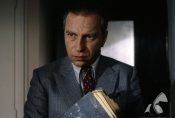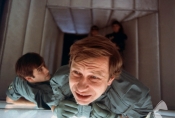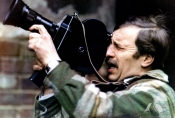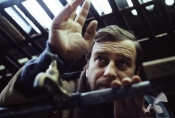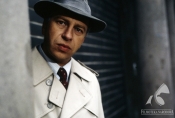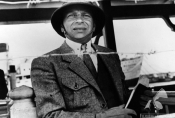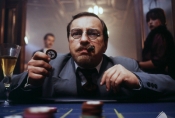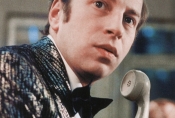Jerzy Stuhr
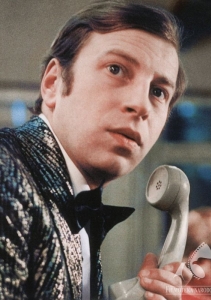
"He seems to be a unique actor in Poland – he is good in whatever field of art he undertakes, be it film, television, or theatre. Why is that? I think there are two elements worth pointing out. The first is his excellent technique, mastered to perfection in virtually every detail. The second aspect, no less important and useful especially in cinema, is his knowledge of reality. Both these skills are, however, dwarfed by his intelligence,” Krzysztof Kieślowski said about his favourite actor in a television programme devoted to Jerzy Stuhr.
He was born on April 18, 1947 in Krakow. He is a graduate of Polish Studies at Jagiellonian University (1970) and the Acting Department of the Krakow National Theatre School (1972). In the years 1972-1991, he worked at the Stary Theatre in Krakow. An excellent educator, in the years 1990-1996 and 2002-2008, he served as rector of the Krakow Theatre School. Winner of many prestigious awards, including “Film Star of the Season" at the Lubuskie Film Summer Festival in Łagów (1980), four Golden Ducks (1985, 2002, 2007, 2008), Superwiktor for 2001 (2002), awards at festivals in Chelyabinsk (2005), Venice (2005), Camerimage in Łódź (2007), Terni (2012), and Prague (2013). Doctor honoris causa of the University of Silesia in Katowice (2007).
He first appeared on screen in a cameo role of an analyst at the Weigl Institute in Trzecia część nocy/Third Part of the Night (1971) by Andrzej Żuławski. His first major film role came five years later in two films by Krzysztof Kieśowski: in the TV film Spokój/Peace (a.k.a. The Calm Before Storm, 1976), he portrayed Antoni Gralak, a former inmate who, after serving his prison sentence, wants to lead a peaceful life. He finds work at a construction site, only to be involuntarily drawn into a conflict between the workers and the manager. The other film, Blizna/Scar (1976) is a paradocumentary about a large factory built as a result of a political decision, contrary to common sense, in an unsuitable location. Here Stuhr played the director’s assistant. These two films marked the beginning of their life-long collaboration, as well as the mutual fascination and friendship between the two artists. In 1979, he starred as Filip Mosz, the title character in Amator/Camera Buff (1980), a 30-year-old driver fascinated by film. He buys a film camera when his daughter is born. From that moment filmmaking consumes him completely. In the final shot of the film, Filip suddenly points his camera lens at us, the viewers...
Amator/Camera Buff turned out to be the flagship work of the cinema of moral anxiety, and Stuhr became its icon. He went on to give other great performances in films by Agnieszka Holland and Feliks Falk. Aktorzy prowincjonalni/Provincial Actors (1978) by Holland is a story about a theatre troupe rehearsing Wyspiański’s play “Wyzwolenie” [Liberation] directed by a renowned director from Warsaw – Stuhr played a corrupt theatre critic from the capital. In Wodzirej/The Entertainer (a.k.a. Top Dog 1977) by Falk, the story of a ruthless struggle for the right to be the entertainer at a prestigious ball in a newly opened hotel – he played the lead character, Lutek Danielak. In Szansa/Chance (1979), also directed by Falk, a drama set in a high school, he was the history teacher.
Authors of the cinema of moral anxiety often referred to the Latin maxim pars pro toto (meaning that by analysing individual components conclusions regarding a larger whole could be drawn). For viewers it was clear that Aktorzy prowincjonalni/Provincial Actors was not only about thespians from a small town – similarly, neither Wodzirej/The Entertainer nor Szansa/Chance were just about the people featured in the story.
In addition to his serious, profound performances in films by Kieślowski, Holland, and Falk, the actor often accepted roles in lighter films, especially comedies. He was particularly fond of Machulski’s approach to filmmaking, and it was in his films that he had the best comedic performances in his career: as Max, who wakes up after 53 years in hibernation only to discover that a nuclear cataclysm has wiped out all the men in the world in Seksmisja/Sexmission (1983); as Kilkujadek in Kingsajz/Kingsize (1987), an eccentric fairy tale about dwarves living in Szuflandia [lit. the Land of Drawers]; Johnny Pollack in Deja Vu (1989), an underrated, brilliant tale of the extraordinary adventures of an American gangster of Polish descent in the land of the Bolsheviks; and PI Ryba, treading on the heels of all those who break the law in Kiler (1997) and Kiler 2 (1999).
Stuhr is a versatile actor, for whom nothing is impossible, as evidenced by his excellent – albeit very different – performances in films by other directors, for example councillor Wagner in Wizja lokalna 1901/Inspection of the Crime Scene 1901 (1980) by Filip Bajon, Soft in O-bi, o-ba. Koniec cywilizacji/O-bi, O-ba. End of Civilization (1984) by Piotr Szulkin, director Zdzich in Pociąg do Holywood/Train to Hollywood (1987) by Radosław Piwowarski, associate professor Ciąglewicz in the Łuk Erosa/The Arc of Eros (1987) by Jerzy Domaradzki, Jan Piszczyk in Citizen Piszczyk (1988) by Andrzej Kotkowski, the councillor in Persona non grata (2005) by Krzysztof Zanussi, or Witkacy in Mistyfikacja/Mystification (2010) by Jacek Koprowicz.
A separate chapter of his career are his roles in the films he directed himself: Gustav in Spis cudzołożnic/List of Adulteresses (1994), five roles (Assistant Professor, a priest, a colonel, a prisoner, and another applicant facing the Interviewer) in Historie miłosne/Love Stories (1997), prosecutor Adam Borowski in Tydzień z życia mężczyzny/Week Life of a Man (1999), Zygmunt Sawicki, a modest bank clerk and owner of a camel in Duże zwierzę/Big Animal (2000), or the hapless Józef Kozioł in Pogodzie na jutro/Tomorrow's Weather (2003).
He is an actor, director, educator, author of screenplays and books. Ten years ago, when asked in an interview for "Gazeta Wyborcza" which profession he identifies with the most, he replied, “I have such an Austrian nature: wherever they put me, I try to do everything as best I can. I think the one I identify with the least is film director. I do not consider it to be an artistic profession. The filmmaking community hates me for such statements, so, I hasten to add – in my case, of course. My films are formed in my head, then on paper – shooting and editing, though important, are simply a way to realise my original idea. And ideas are the most important. Therefore, I always tell my students: failed films are mostly the result of mistakes in the script. If you make a mistake in your script, there is no way to fix it later. If an actor can’t act, you can work around it, you can recast the role, you can change his voice, but if you put something stupid in the script, there’s nothing you can do. What is stupid, remains stupid forever.”
Selected filmography
-
1977
THE ENTERTAINER (TOP DOG)
reż. Feliks Falk
-
1979
CAMERA BUFF
reż. Krzysztof Kieślowski
-
1982
THE MOTHER OF KINGS
reż. Janusz Zaorski
-
1983
SEXMISSION
reż. Juliusz Machulski
